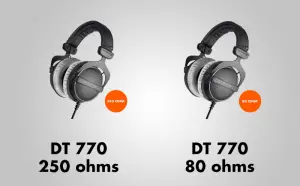Introduction – what are ‘ohms’, and how are DT 770 Pro 250 Ohms different from the 80-ohm version?

Scientifically speaking, an ‘ohm’ is an electric resistance unit and is a widely accepted parameter. Basically, the more ohms a device has, the better it conducts the electric current, or plainly speaking, more ohms equals more resistance, which means that there will be less electric power passing through the headphones in this case.
However, when we’re talking about DT 770 Pro’s versions 250-ohm and 80-ohm versions, there are way more differences between them than a plain number of ohms. Without any further ado, let’s see how these two headphone models are different from one another.
Before we get to comparing the 80ohm and 250-ohm versions, we should mention that our starting point is the ‘standard issue’ models, not limited edition ones. However, since we’re at it, let’s briefly say the differences between the Pro 80 ohms and standard 80 ohms headphones.
Firstly, the ear pads found on the 80 ohms limited edition version are completely black. Additionally, the velour appears to be somewhat less soft in comparison to the standard version. This means that you’ll get a different sound from them, as well as a different type of feel (comfort). Additionally, they cost quite a bit more than the standard version.
Sound quality
First of all, let’s begin by saying that the sound you’ll get from DT 770 pro headphone versions is strikingly different depending on whether you’re using the 80-ohm or the 250-ohm headphone version.
The DT 770 pro 80-ohm is packed with plenty of bass and slightly less accentuated treble section. Furthermore, these aspects of the soundstage scale phenomenally as you crank up the master volume.
A similar thing can be said about the DT 770 Pro 250 ohm headphone version – the bass is strong, the treble is okay, and it generally sounds good. However, the highs on this model are quite chirpy and harsh, perfect for studio workers who are usually complaining about ‘not hearing enough highs in the mix’.
On another hand, the DT 770 Pro 80 ohm is excellent for casual use and monitoring. Critical listening could be taken into consideration with these headphones, but the ultra-strong bass might prevent you from reaching an objective point of ‘view’ with them.
Design and comfort rating
Both DT770 80 ohms and 250 ohms share the same type of design – they’re closed-back headphones. This type of design somewhat chokes the breathability of these headphones, but it substantially increases the ambient noise reduction they provide in a passive form.
Although there’s no active noise-canceling technology onboard, the closed-back design allows the wearer to immerse completely in the music without bothering anyone around. However, the downside of these headphones is in the fact that it helps build up sweat a bit faster, plus they weigh slightly more than open-back headphones.
On a brighter note, the 250 ohms version is lighter and doesn’t build up sweat that fast, which makes it a bit more comfortable to use by a long shot.
In conclusion, since both of these models have the same type of design, it comes down to little details and nuances to determine the victor of this round, and that would be the DT 770 250 ohms version.
Price
The price is a factor that most people think about first – some people are looking for budget headphones to replace the ones that have just died out, others are looking for upgrades, but all of this usually transpires within a pre-determined budget.
If we’re to compare the DT770 80ohms and 250ohms versions through their price tag, you shouldn’t worry about how much they cost as they’re both essentially mid-priced headphone models.
The DT770 250 ohms headphone version appears to be somewhat cheaper than the 80-ohm variation, though only by a couple of dollars. Even so, they belong to the same price point category, and basically, both models are well worth the buck.
Pros and cons
In a nutshell, the 250-ohm variation of the DT 770 is highly versatile and comfortable, but it’s most suited for studio environments. Though it might not be the perfect pair of headphones for someone who wants to enjoy listening to music, it’s great for professional musicians and studio engineers.
The DT 770 pro 80-ohm version is pretty similar to the 250ohm version, but it’s more suitable for casual listening and somewhat less intended for critical listening. The bulk of the features remain the same, and it’s generally equally valuable for the cash.
| DT 770 250-Ohm | DT 770 80-Ohm | |
|---|---|---|
PROS:
|
PROS:
|
|
CONS:
|
CONS:
|
|
| check prices | check prices |
Final Verdict
It’s difficult to say which version is better simply because these headphone versions were intended for different kinds of purposes. While the 80-ohm version is better for critical listening, the 250-ohm version is somewhat better for casual listening.
On the flip side, you can enjoy your music outdoors with the 80-ohm version whereas the 250-ohm version should be used in a bit more private environment. All things considered, though, both of these headphone versions are of exceptional quality.
Disclosure: This post contains affiliate links. As an Amazon Associate, I earn from qualifying purchases. This means that if you make a purchase through one of these links, I may earn a small commission at no additional cost to you. Thank you for your support!


